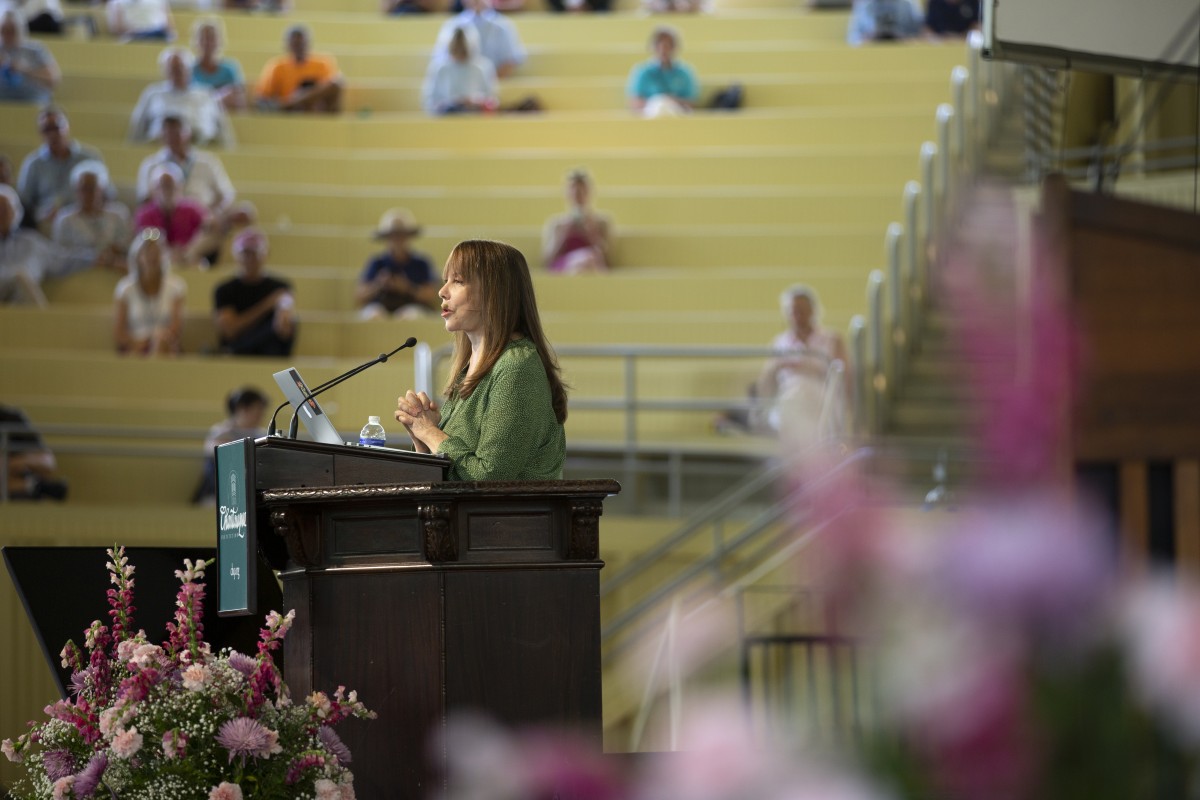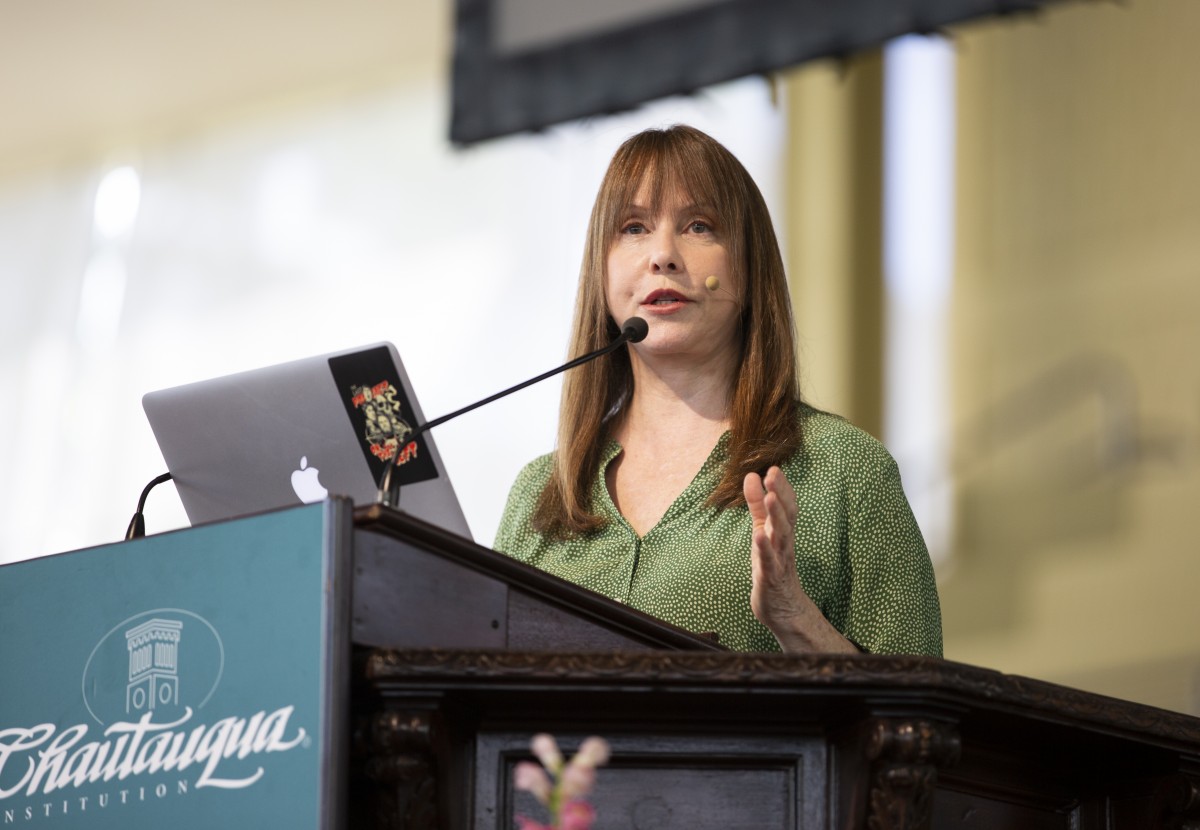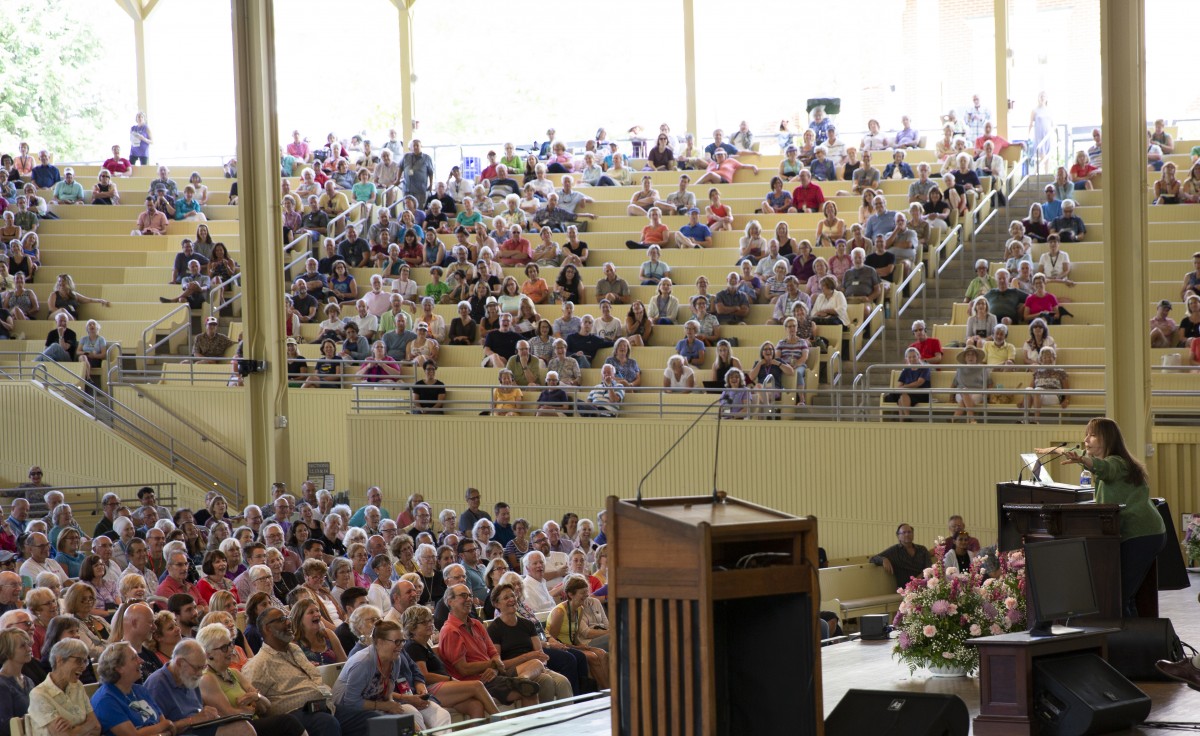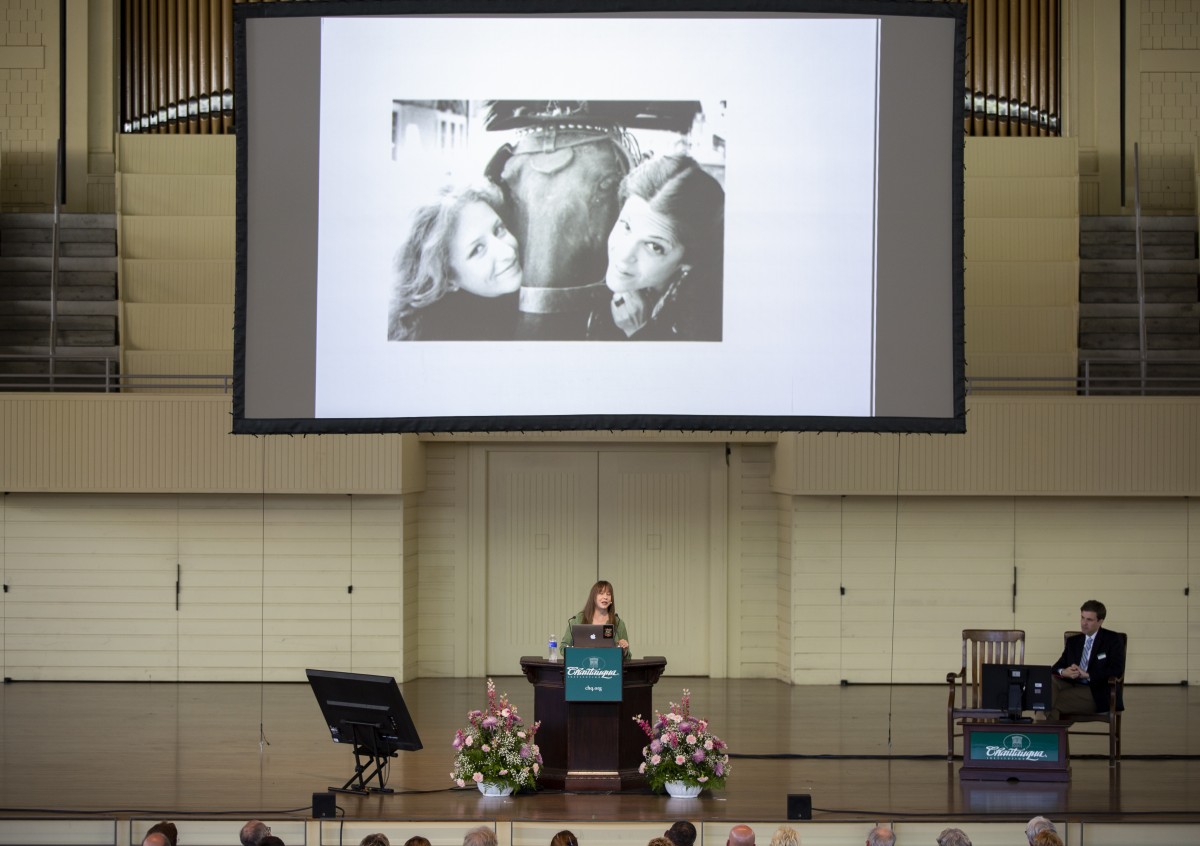Laraine Newman knows play is an art.
The original “Saturday Night Live” cast member spoke to “basically how improv and humor can save the world” (and she was not kidding) at the 10:45 a.m. morning lecture Friday, July 13, in the Amphitheater as the punchline of Week Three’s theme, “The Art of Play.”
“Eve Arden, Madeline Kahn and Richard Pryor were my first major influences,” Newman said. “They led me into my life of comedy, they led me into understanding ‘The Art of Play.’ ”
Her comedy career began as a young girl in a toy store. Sweet and innocent, Newman said she would walk aimlessly through the rows of toys and then, in a flash, she would stuff rubber animal erasers down her underpants and run out of the store. Her scam worked — until she brought an unseasoned thief along.
The accomplice got caught by a salesperson. Newman, in a fit of panic, used her improvisational skills.
“We got those over at Newberry’s and if you don’t believe me, you can come with us over there and ask them,” she said.
The salesperson let them go.
“You might be saying to yourself, ‘Well that’s not improv, that’s just lying,’ ” she said over a burst of laughter. “And you’d be right, but it’s the lie of a 9-year-old pretty much feeling like she is fighting for her life. So the way I guess you say it is, ‘survival itself is an improvisation.’ ”
Newman explained the guiding principle of improv: to say “yes, and,” to any — and every — thing. This means that every response should be an affirmation, not a “no, and” or a “yes, but,” which Newman said is the same as a “no.”
“Yes, and” is not exclusive to improv; giving positive affirmations should extend into everyday life, Newman said, including for those suffering from Alzheimer’s disease. Newman described her friend and fellow comedy writer, whose mother suffered from early onset Alzheimer’s.
Her friend began giving positive responses to her mother’s complaints that someone was in her house, with questions like, “Why do you think someone is there, what do they want?” rather than, “No one is in your house, Mom.” Both her and her mother’s frustrations rapidly decreased.
“Of course, it was always possible that she was actually being robbed, but that’s the risk with improv,” Newman said over an epic roar of laughter.
Improv can also be a problem solver and character builder, which she illustrated through an anecdote about being locked in a room in New Orleans with fellow “SNL” Not Ready For Prime Time Player Gilda Radner.
Too scared to leave for fear of being mobbed, the two sat in an empty room for hours waiting for a cue from the “SNL” crew that it was time to leave. Hungry, bored and cold, Radner fashioned a puppet out of the only other thing in the room — a trash can with a foot pedal.
“I remember saying something like, ‘Man, I am hungry,’ ” Newman said.
In response, Radner said, in a half-Italian, half-Oscar the Grouch accent, “I might have something for you to eat. I think I have some peanuts — oh no, sorry, there is something disgusting all over them.”
“Man, I’ve got to pee,” Newman said.
“Don’t look at me,” Radner (as the trash can puppet) said.
This banter continued throughout the day.
“It really made the four hours go by faster,” Newman said, reflecting on that fiasco. “We made the best of the fact that we were cold, bored, thirsty, hungry and had to pee.”
Later on in her career at “SNL,” Radner and Newman took part in a presentation at the Brooklyn Academy of Music. That day, Newman was ill and took medication for her symptoms. Midway through the rehearsal of their speech, Newman’s jaw clenched and her tongue dropped to the bottom of her mouth from an allergic reaction to the medication.
They scrambled to come up with a routine, eventually landing on an act where Radner did all the talking and Newman accompanied her with sound effects. Newman’s noises ranged from a possessed chicken to a crying baby to a dog whose paw had just been crushed.
Newman, unexpectedly, demonstrated the shrieking dog for the audience. The high-pitched, ear-shattering noise threw the Amp into a frenzy of admiring “oohs” and painful “ahhs.”
“These moments with Gilda felt so dire, but thank god for her,” she said. “And thank god for our improv training, that fellowship that we both belonged to. The experience of imaginative play can transport us to a reality of our own making, and sometimes that reality we create can help us manage our fear.”
Play to manage fear translates into two fascinations of the early 20th century: haunted houses and horror movies, in which simulated horror gives people a feeling of invincibility.
“There are so many scary things in this life that we cannot control — economic failure, terrorism, a host of other things I don’t know if I should mention because I don’t know who I will offend, but you know what I mean,” Newman rattled off.
Haunted houses and scary movies aside, there are other ways for adults to enjoy play, she said, like cosplay or Dungeons & Dragons — “How great is it that dress up is no longer the exclusive domain of children?” But more universal than that, play is found in just playing with children.
“I think that we can all agree and recognize that there is something so intimate about shared, fun experiences that involve listening, cooperation and laughter,” she said. “It’s a special kind of bonding that shows (children) what relationships can be like out in the world.”
Play appeared in Newman’s parenting through party planning, creating and embodying the personality of their family dog and, of course, improv. Newman stressed the distinction between stand-up, improvisational and sketch comedy.
“A lot of people assume that if you have a comedy background, you’ve done stand up,” she said, violently shaking her head and pulling her arms tight against her chest. “No. God, no. … It’s an entirely different animal.”
Newman admitted she was “never a good improviser,” but when in character, like an angry Jewish poet, a flight attendant, an eccentric chef or a British groupie, she was “free.”
“When I first performed (my characters) and the audience responded, I felt like crying,” Newman said. “I mean the idea that what I saw — what other people saw — (meant) I wasn’t so alone in my perspective. I hope this doesn’t sound too overblown, but it really did feel like a Communion.”
Those characters helped create some of “SNL’s” iconic sketches. At Lorne Michaels’ loft in New York City, the cast of “SNL,” in the beginning stages of the show, met to improvise. Prompted by the phrase “alien family,” Newman, Dan Aykroyd and Jane Curtin took a trip to Easter Island using a kooky voice Newman created, and “Coneheads” was born.
“Some of the greatest improvisers I’ve ever seen seem to have an open channel to their unconscious,” she said. “Their unconscious is pretty damn funny.”
And before anyone fears ridicule or humiliation for trying something new, whether it be a hairstyle or improv, Newman had a reminder: “We’re all going to die.”
“How (can play, improvisation and humor) be a bridge for communication and empathy?” she said. “How it can evolve fellowship and community? … Every time you make someone laugh, follow someone’s lead, even if it’s a stranger, … every time we accept a child’s reality, we are giving love and affirmation. And how can that not make for a better world? Now go out and play.”
After the conclusion of Newman’s lecture, Chief of Staff Matt Ewalt opened the Q-and-A with the daily reminder:
“As we enter into our Q-and-A, I know a few of you have to leave for other programs, please be as respectful as possible —”
“Yeah, I’m not taking it personally at all,” Newman said as she sarcastically cried into her hands.
After Ewalt and the crowd had a good laugh, he asked Newman if the relationship between people onstage and people in the audience is important in improv comedy.
“(The audience is) really appreciative and they know how hard it is, so if you’re even slightly funny, they really appreciate it,” she said. “And also you’re working off of their suggestions, so they’re kind of invested in your success. But I do think that they are very different from a stand-up audience because the nature of stand-up is so different, and improv really does involve the audience.”
Ewalt continued the Q-and-A by asking that while previous lecturers established that there is a play deficit among children, is there a play deficit among adults?
“I think that there is something considered slightly shameful if we behave in a way that isn’t expected of adults,” Newman said. “More and more now, actually, our culture is supporting (play) as in things like cosplay. … So I guess it has changed somewhat to where people are really given the permission to play more.”
The audience was then given a chance to ask questions; one attendee asked what type of comedy works in the country’s polarized political climate.
“Irony. … I mean, to do comedy, you have to have critical thought, you have to be a reflective person. You have to be able to see the irony of things and be very sensitive to things, and I think that’s kind of more conducive to liberals,” Newman said, cringing and incrementally lowering her voice.
To close Week Three, Ewalt asked if Newman had any tips for someone looking to break into comedy.
“Listen to everybody so that you start where they leave off, so that you’re not a derivative of anybody that’s come before because originality is absolutely key,” she said. “Also, read — read, read, read.”
ABIGAIL DOLLINS / PHOTO EDITOR
Laraine Newman, an original cast member of “Saturday Night Live” and founding member of improv group The Groundlings, discusses the emotional benefits of improv, play and humor on Friday in the Amphitheater








